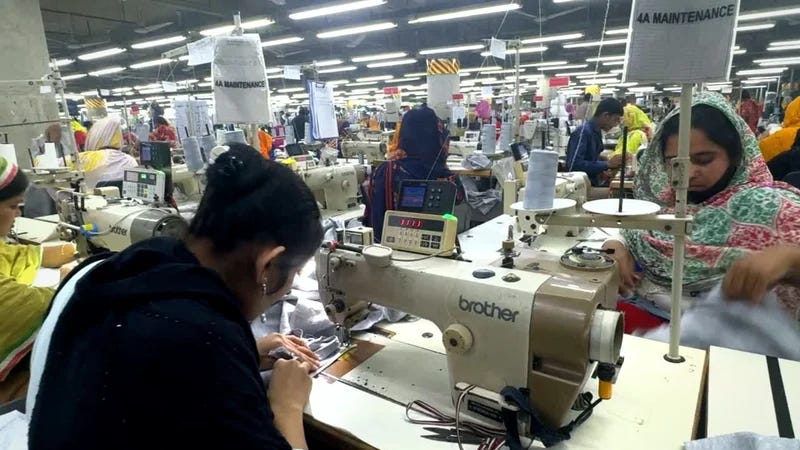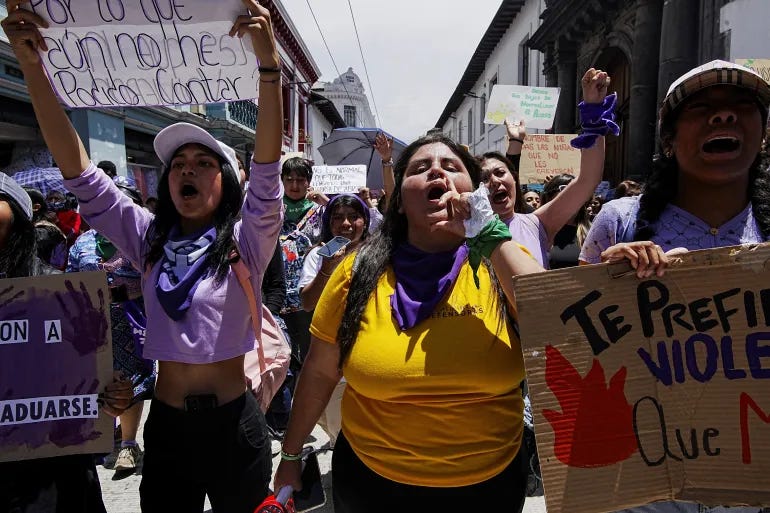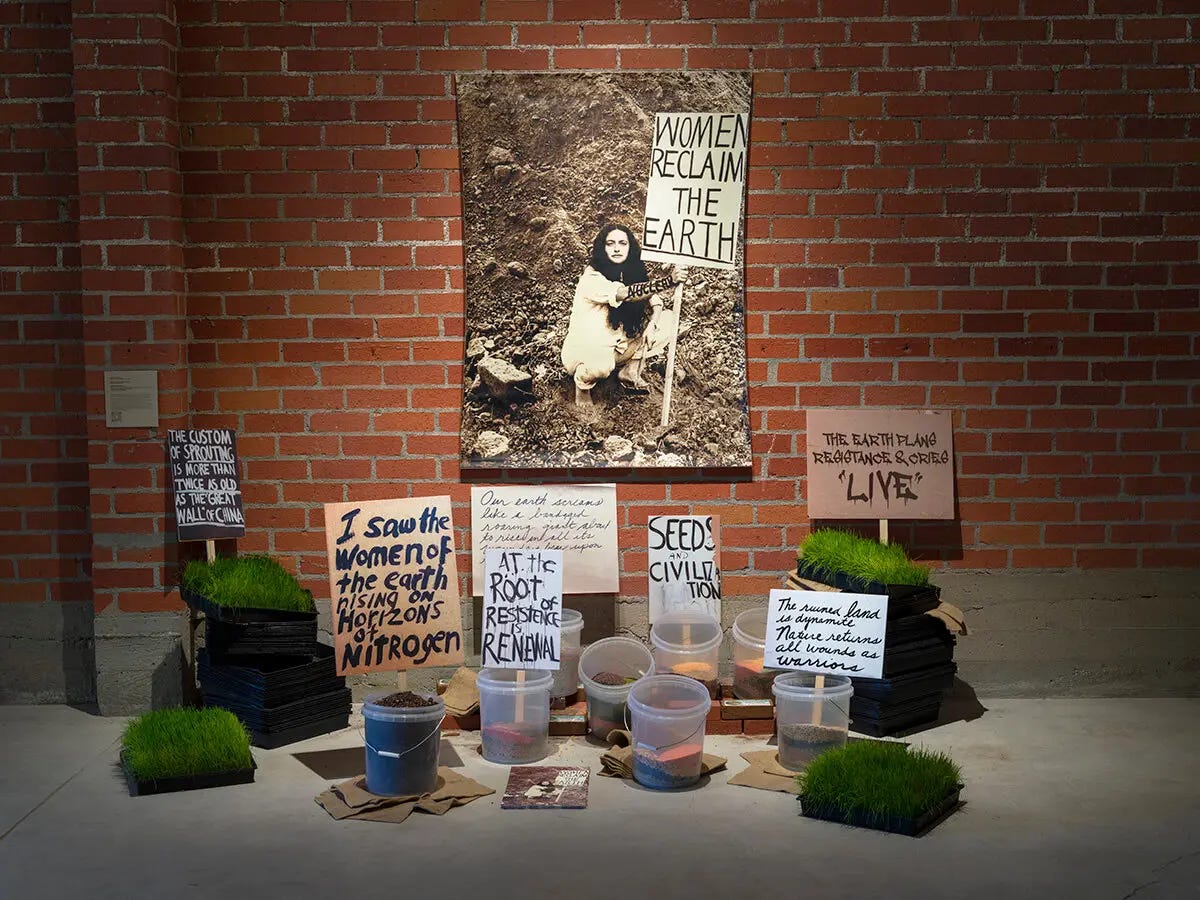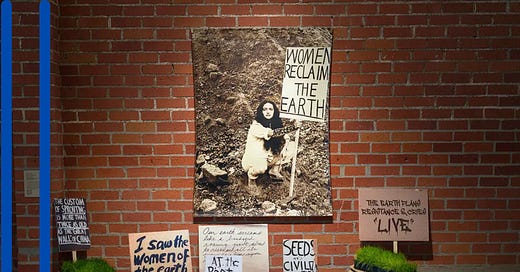“The Intersection” is your briefing on global affairs, human rights, sustainability, social innovation, culture, and design—offering fresh insights through the lenses of sustainable development, women-centered perspectives, and emerging global trends. The aim? To keep you informed, curious, and always ready with a compelling conversation starter at the dinner table.’’
Global Affairs

In Bangladesh’s garment sector, a surge in automation and surveillance is reshaping factory floors, with devices like the Nidle tracking workers’ output and idle time. As factories in Dhaka adapt to automation to compete with lower-cost producers like Vietnam and Cambodia, workers, especially women, face increasing pressure. The smart technologies are hailed for improving productivity and reducing labor costs, making factories more attractive to global brands such as H&M and Zara. However, union leaders argue that while automation boosts production, it has led to job cuts and intensified workloads, with wages only rising due to worker protests. The shift to automation, while increasing efficiency, disproportionately affects female workers, who are less able to access training for more automated tasks. As competition intensifies, the demand for automation grows, but the benefits remain unevenly distributed, leaving many workers, especially women, grappling with higher expectations, longer hours, and stagnant wages. Brands may celebrate the efficiency of smart factories, but the human cost of this rapid technological shift is clear.
Rodrigo Duterte, the former president of the Philippines, arrived in the Netherlands on Wednesday, bracing for charges at the International Criminal Court (ICC) over his controversial war on drugs. Accused of being an “indirect co-perpetrator” of crimes against humanity, Duterte faces allegations that his anti-drug campaign, which rights groups claim killed tens of thousands, was marred by systemic abuse. He is the first Asian former head of state to face charges at the ICC. While some Filipinos view his arrest as a triumph for international justice, others, including his supporters, decry the transfer as "kidnapping" and political persecution. Duterte’s legacy remains divisive, with continued support from many who backed his aggressive policies, despite the ongoing international scrutiny of his actions. (To learn more about this period of Filipino history, I highly recommend this book.)
In Greenland, snap parliamentary elections on Tuesday led to a dramatic shift in the political landscape. The center-right Demokraatit party surged to first place, tripling its seat count, while the pro-independence Naleraq party came in second with nearly 25 percent of the vote. Prime Minister Mute Egede confirmed that coalition talks would follow, with two pro-independence parties emerging as clear victors. Their success reflects a growing wave of Greenlandic nationalism, particularly amid U.S. calls for the acquisition of the territory—a notion firmly rejected by both Greenland and Denmark. Danish Prime Minister Mette Frederiksen described the election as a celebration of democracy.
Meanwhile, political turmoil unfolded in Portugal, where the center-right minority government lost a no-confidence vote on Tuesday, forcing Prime Minister Luís Montenegro to step down. Montenegro's Democratic Alliance narrowly secured first place in the March 2024 election, but failed to form a stable coalition, amid significant gains for the Socialist Party and the far-right Chega party. This political instability marks the worst crisis in Portugal since its transition to democracy in 1974, with President Marcelo Rebelo de Sousa indicating that fresh elections could take place as early as May, making this Portugal's third election in just three years.
The arrest of Mahmoud Khalil, a Columbia University student and legal resident, by US Immigration and Customs Enforcement has sparked a fierce debate over free speech and government overreach. Accused of ties to Hamas but not charged with a crime, Khalil was taken into custody without explanation, with officials later citing national security concerns. A judge has temporarily blocked his deportation, but civil rights advocates warn that the case signals an alarming shift—using immigration status as a tool to silence political dissent. Coming just after the Trump administration cut federal funding to Columbia over its handling of pro-Palestinian protests, the move has cast a chilling effect over campus discourse and beyond. As the legal battle unfolds, the case could redefine the boundaries of the First Amendment for immigrants and set a troubling precedent for political expression in America.
US House Republicans have revived the SAVE Act, a bill purportedly designed to block non-citizens from voting—despite the fact that such voting is already illegal. Voting rights groups warn that the legislation would create unnecessary hurdles for millions of Americans, particularly women who have changed their legal names through marriage, assimilation, or gender transition. Critics argue that the bill fuels a false narrative about election fraud while effectively suppressing voters, especially those in marginalized communities who may lack immediate access to required documents. While proponents claim the legislation includes provisions to accommodate name changes, opponents contend it would complicate registration, burden election offices, and deter participation. With the 2026 midterms on the horizon, the debate underscores broader questions about access to democracy and the growing politicization of voter eligibility laws.
Katie Porter, the former California congresswoman, has entered the race to succeed Gavin Newsom as the state’s governor. Known for her white-board moments in Congressional hearings, Porter is among the first to enter the race while others wait to see if Kamala Harris will throw her hat in the ring.
Human Rights

From Buenos Aires to Lagos, women worldwide took to the streets on International Women’s Day, demanding justice for victims of femicide and an end to gender-based violence. In Argentina, where one woman is killed every 30 hours, protests turned to outrage over President Javier Milei’s austerity measures, which include shutting down the Ministry of Women and scrapping femicide from the penal code. Across Latin America, demonstrators called for justice, while in Europe, marches highlighted gender pay gaps, reproductive rights, and systemic inequalities. In Poland, activists opened an abortion centre in defiance of strict laws, while in Spain, protestors rallied behind Gisele Pelicot, a French survivor who has become a symbol of resistance against sexual violence. In Lagos, thousands gathered in celebration, dressed in purple, while Ukraine honoured its fallen female soldiers. The message was clear: the fight for women’s rights is far from over.
The Trump administration’s decision to end all US funding for the UN Population Fund (UNFPA) has sent shockwaves through the global aid community. The cuts—48 grants totaling $377 million—will shutter critical maternal health programs, rape crisis services, and reproductive care in some of the world’s most fragile regions, including Afghanistan, Gaza, Sudan, and Ukraine. UNFPA warns that clinics will close, midwives will lose resources, and women in crisis zones will be left without safe childbirth options. The decision also halts US-backed efforts to combat malaria, HIV, and malnutrition, prompting InterAction, a coalition of humanitarian organizations, to warn of dire consequences: “Women and children will go hungry, food will rot in warehouses while families starve, children will be born with HIV.” Over the past four years, US contributions helped prevent 17,000 maternal deaths and millions of unsafe abortions. With this funding now gone, UNFPA urges a reconsideration, citing decades of partnership that have saved lives and strengthened economies. While support may waver, the agency remains steadfast in its mission: ensuring that women and girls—often the hardest hit in crises—retain access to essential care.
A new UNICEF report warns of a harrowing surge in sexual violence against children in Sudan, where conflict has displaced over 11 million people since April 2023. The number of gender-based violence cases has risen by 288 percent, with at least 221 child rapes—including infants as young as one—reported since the start of 2024. UNICEF Executive Director Catherine Russell calls it an “abhorrent violation of international law” and urges all parties to end the brutality. With survivors facing stigma, trauma, and a lack of services, UNICEF is expanding safe spaces and medical aid while pressing for immediate global action to protect Sudan’s most vulnerable.
Maiga, a long-time activist and founder of the Association Defund Police Initiative to Pay, has made it her life's mission to combat the spread of weapons in Mali. A military family's daughter, she witnessed the devastating toll of conflict firsthand, particularly during a 2018 attack in Gao that left destruction and bloodshed in its wake. "You can't build peace in an environment of violence," she says, emphasizing the importance of resolving disputes without resorting to arms. Maiga is dedicated to educating women on the dangers of firearms in homes and insists that women must play a pivotal role in peacebuilding. Her work not only raises awareness but also strives to disarm conflict zones and advocate for sustainable peace, reinforcing that security can only be achieved when women are integral to decision-making and rebuilding efforts.
Environment & Climate

In the wetlands of Pulicat Lake, India's bristle worms are facing a quiet crisis. These vital creatures, integral to the local ecosystem, are being poached in increasing numbers, threatening both wildlife and the livelihoods of local women who rely on fishing. The worms, a crucial food source for fish and crustaceans, are sold to aquaculture farms for their nutritional value. However, the unsustainable harvesting practices, often carried out by poachers using buckets to collect worms, disrupt the delicate food chain and degrade the wetland’s soil. Local women, including Jyothi, have taken matters into their own hands, forming vigilant groups to protect the marshlands from these poachers. With few government interventions, they have resorted to strategies that include confronting poachers directly and raising awareness within their communities. Experts suggest that legalizing the trade in a controlled manner could help preserve both the worms and the delicate ecosystem. Yet, as the poaching continues unchecked, locals face a growing challenge—one that threatens not only the natural environment but their future livelihoods.
Canada’s food security is more fragile than they would like to believe, with nearly 80% of their grocery market controlled by five corporations deeply tied to U.S. supply chains. As Trump’s trade policies threaten cross-border imports, Canadians face rising food costs and potential shortages, exposing a critical vulnerability: a nation that cannot feed itself is not secure. The solution lies in shifting toward regional food networks, investing in small and mid-scale farms, strengthening local food hubs, and encouraging consumer support for independent producers. A resilient food system isn’t just about price—it’s about sovereignty, sustainability, and national strength.
A study by the University of Michigan is urging Americans to reconsider their laundry habits, highlighting the significant energy costs of clothes dryers, which consume about 3% of the U.S. residential energy budget. Dryers cost over $7 billion annually to power and emit more than 27 million tons of CO2. With over 80% of U.S. homes owning a dryer, the study suggests embracing air drying as a more sustainable alternative. Researchers found that line drying could save households up to $2,100 and reduce CO2 emissions by over three tons. Even a combination of line drying and occasional dryer use was more cost-effective and eco-friendly than upgrading to an energy-efficient dryer. The study also revealed that emissions from dryers vary by region, with areas relying on coal producing significantly more CO2. While moving toward cleaner energy grids is one solution, the simplest action may be rethinking our reliance on dryers altogether.
Social Innovation

The Regenerative Cotton Standard (RCS), launched by the Aid by Trade Foundation (AbTF), has shown promising results in India’s Maharashtra region, where 5,000 farmers in over 70 villages adopted regenerative practices, yielding 2% more cotton while reducing costs by 7%. Using biochar to rejuvenate depleted soils boosted yields by 15%, and training methods have been well-received by 90% of participants. With a focus on soil regeneration, crop rotation, and organic nutrient management, the RCS has increased farmer incomes and demonstrated its potential to support sustainable cotton cultivation amid climate change. The model also provides buyers with transparent, traceable cotton, meeting growing demand for supply chain accountability.
In 2024, the U.S. power grid experienced its largest solar capacity addition in over two decades, with 50 gigawatts of new solar generation outpacing all other energy sources. This milestone comes as the U.S. Energy Secretary Chris Wright criticized solar and wind energy for their inability to meet the growing electricity needs and for driving up energy costs. Wright, along with many Republicans, has long opposed renewable energy, advocating for the rollback of climate policies put in place by the Biden administration. However, despite the criticism, solar energy and battery storage are gaining significant traction. Proponents argue that solar is the fastest and cheapest way to meet the world’s electricity demands, particularly as data centers and AI technologies drive an unprecedented increase in electricity consumption.
At a recent energy conference, John Ketchum, CEO of NextEra Energy, acknowledged that renewables, especially solar, can deliver new electricity generation quickly and affordably. Meanwhile, Wright’s assertion that wind and solar are causing rising electricity prices conflicts with the growing consensus that clean energy solutions are necessary to build a reliable, low-carbon future. Although electricity rates have risen, driven partly by increased fuel costs and grid upgrades, energy demand is projected to soar in the coming decades, making investments in solar and storage essential to meeting future needs while addressing climate change.
Microsoft has committed to purchasing 1.5 million tonnes of carbon credits over 30 years from the Panna Afforestation Project in India, developed by Climate Impact Partners. This project, which will plant over 11.5 million native trees across 20,000 hectares, is the company's largest in the Asia-Pacific region and its first carbon removal initiative in India. The project, funded by Terra Natural Capital, aims to produce 3 million tonnes of carbon credits, half of which will be bought by Microsoft. By planting native species like mango, guava, teak, and neem trees, the project will improve biodiversity, support local farmers with income from fruit sales, and create training for climate-smart agriculture. Microsoft’s investment is part of its broader goal to be carbon-negative by 2030 and reflects the growing role of nature-based solutions in tackling climate change.
Culture & Design

Curator Catherine Taft initially approached her research on ecofeminism as a retrospective on a movement that had seemingly faded into history. Emerging in the 1970s at the intersection of environmental, feminist, and anti-nuclear activism, ecofeminism positioned itself in opposition to systems of patriarchy and capitalism, advocating for a more collaborative, holistic relationship between humanity and nature. Yet, by the 1990s, critics dismissed it as essentialist, and the movement receded—until recent global reckonings with social and environmental justice sparked a resurgence.
Taft’s exhibition Life on Earth, now on view at West Den Haag in the Netherlands, reframes ecofeminism as an urgent strategy for contemporary survival, showcasing artists who interweave ecological consciousness with feminist thought. A 24-hour symposium on March 21 will accompany Life on Earth, connecting global perspectives from Seoul to The Hague to Los Angeles. Through a diverse array of voices and media, the exhibition underscores ecofeminism’s renewed relevance—not as nostalgia, but as a necessary framework for reimagining the future.
Cate Blanchett is set to lead a new initiative to support refugee filmmakers, offering up to €100,000 each to five individuals to create short films focused on the experiences of displaced people. The Displacement Film Fund, backed by the International Film Festival Rotterdam and the UNHCR, aims to support filmmakers with refugee backgrounds or those experienced in telling refugee stories. Blanchett, a UNHCR goodwill ambassador, noted the power of film to intimately convey the realities of displacement, a global crisis affecting 122.6 million people. The selected filmmakers will be announced at the Cannes Film Festival in May, with a committee including Cynthia Erivo, Waad al-Kateab, and Aisha Khurram. The fund seeks to provide opportunities for filmmakers often overlooked by the industry, empowering them as creative leaders rather than mere subjects.
The domesticated cat's journey to China, long a subject of speculation, has been traced through genetic testing to around 600 C.E., over 1,500 years after they spread to Europe. Researchers found that cats, likely introduced via the Silk Road, arrived in China as prized gifts for the elite, eventually becoming ingrained in local culture and even folk religion. The study, which analyzed the remains of 22 cats from 14 archaeological sites, confirms that domestic cats in China trace their origins to the Middle East, specifically Kazakhstan, aligning with ancient trade routes. The discovery highlights not only the spread of these mysterious companions but also their revered status in early Chinese society.
Zitkála-Šá (1876-1938), born on the Yankton Sioux Reservation, emerged as one of the most influential Indigenous activists of the 20th century. A gifted writer, musician, and advocate, she co-founded the National Council of American Indians in 1926 to champion Native rights and secure U.S. citizenship for Indigenous peoples. Her early life on the reservation was steeped in the freedom of her mother's care, but at the age of eight, she was taken by missionaries to the White’s Indiana Manual Labor Institute, a boarding school that sought to erase her cultural identity. Although the experience left her torn between two worlds, Zitkála-Šá excelled academically, winning oratory competitions and becoming an accomplished violinist. Her struggle with cultural dislocation informed her later writings, including the poignant "The School Days of an Indian Girl," which exposed the emotional turmoil inflicted by such institutions (pdf version here).
Zitkála-Šá’s talents flourished as she pursued higher education in the East, attending Earlham College and the New England Conservatory of Music. Despite her academic success, she grew disillusioned with the assimilationist policies of the Carlisle Indian Industrial School and returned to her writing. Her articles in Harper’s Monthly and The Atlantic Monthly brought national attention to the systemic exploitation of Indigenous peoples. Notably, her 1923 article, “Oklahoma’s Poor Rich Indians,” exposed the widespread graft and exploitation of the Osage Nation, which helped influence the Indian Reorganization Act of 1934, aimed at reversing harmful land allotment policies. Zitkála-Šá also advocated for Native American citizenship, playing a pivotal role in the passage of the Indian Citizenship Act of 1924, and worked tirelessly to unite the tribes in their fight for equal rights.
Beyond her political activism, Zitkála-Šá was a pioneering artist and composer. Her opera The Sun Dance Opera, which centered on the sacred Sun Dance ceremony, made history as the first opera written by a Native American woman. Premiering on Broadway in 1938, just weeks after her passing, the opera cemented her place in both the cultural and political spheres. Her legacy continues to resonate today, with her contributions to Native rights and cultural preservation celebrated at the Smithsonian American Women’s History Museum and through her memorialization on a 2024 U.S. quarter. Throughout her life, Zitkála-Šá bridged the gap between Native American traditions and the demands of mainstream society, ensuring that the stories and struggles of Indigenous peoples remained a central part of the national conversation.
What have you been researching recently?
Jennifer
xxx






